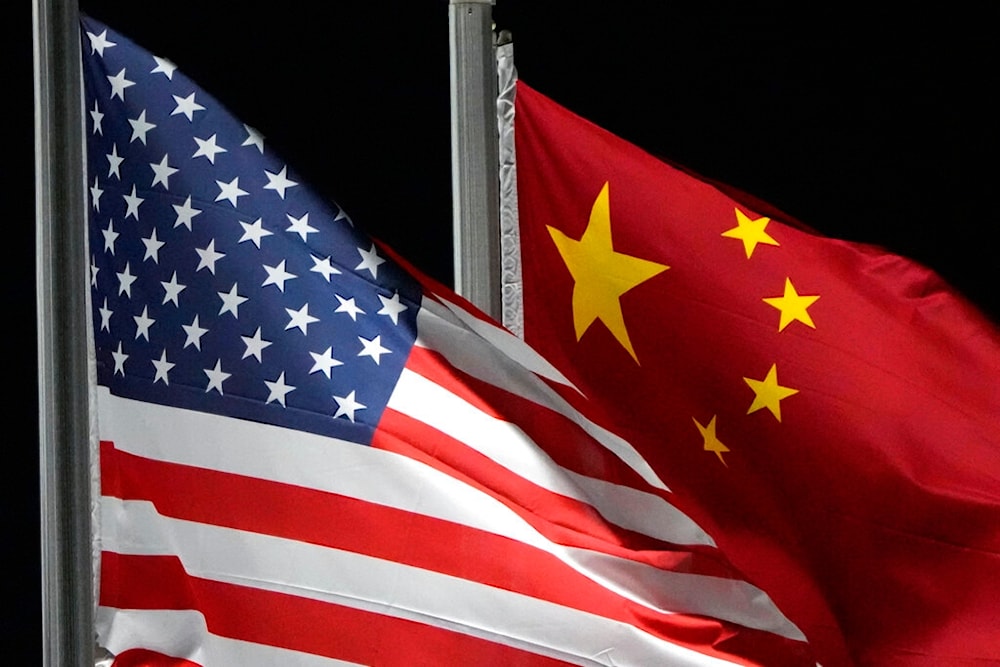China, US defense chiefs break 18-month streak, discuss ties, Taiwan
The Taiwan issue was at the core of the two officials' discussions.
-

The American and Chinese flags wave at Genting Snow Park ahead of the 2022 Winter Olympics, February 2, 2022, in Zhangjiakou, China. (AP)
For the first time in 18 months, the US and Chinese defense chiefs, Lloyd Austin and Dong Jun, held significant talks during a teleconference on Tuesday, amid the US endeavors to strengthen its position and ties in the Asia-Pacific region.
The Pentagon issued a statement soon after, detailing that both chiefs discussed inter-defense relations, as well as regional and global security issues. It also highlighted that the US seeks to maintain secure bilateral military communication lines to avoid any escalation in tensions that could spin out of control.
Reportedly, Austin emphasized that the US will continue to fly and sail "wherever international law allows" and "underscored the importance of respect for high seas freedom of navigation guaranteed under international law, especially in the South China Sea."
Dong Jun, on the other hand, stressed the vitality of trust and peace between both nations, saying, "The military sphere is the key... to stabilizing the development of the relationship and preventing major crises from occurring."
However, he also warned the US against dismissing China's stance on Taiwan, reiterating that the island's interests rest in the Chinese core.
"Dong Jun emphasized that the Taiwan issue is the core of China's core interests," the Defense Ministry readout said.
"The US side should recognize China's firm position, respect China's territorial sovereignty and maritime rights and interests in the South China Sea, and take practical actions to safeguard regional peace," it added.
With multiple points of contention miring relations between Washington and Beijing, the senior US defense official said that the Pentagon and China "are continuing to discuss future engagements between our senior defense and military leaders," adding, "These engagements provide us with opportunities to prevent competition from veering into conflict by speaking candidly about our concerns."
Read more: Yellen, Premier Li express hope for US-China cooperation
Philippines: Deal with US, Japan to shift dynamic in South China Sea
The US has been expanding its presence in the Asia-Pacific region to counter China's influence by developing relations with regional nations, mainly Japan, Taiwan, and the Philippines.
On Friday, Filipino President Ferdinand Marcos Jr. stated that a trilateral agreement involving the Philippines, the United States, and Japan would alter the dynamics in the South China Sea and the broader region. He also reassured China that the agreement was not aimed at targeting them.
"I think the trilateral agreement is extremely important," Marcos told a press conference in Washington a day after meeting US President Joe Biden and Japanese Prime Minister Fumio Kishida in the nations' first trilateral summit.
He said, "It is going to change the dynamic, the dynamic that we see in the region, in ASEAN in Asia, around the South China Sea," referring to the Association of Southeast Asian Nations.
The three leaders conveyed "serious concerns" regarding China's alleged "dangerous and aggressive behavior" in the South China Sea, an essential route for over $3 trillion in annual maritime trade. The region is marked by various naval disputes involving China and other nations.
Read more: China to protect its firms against possible anti-Russian US sanctions

 3 Min Read
3 Min Read








